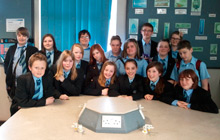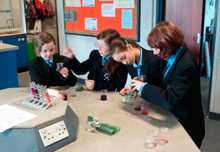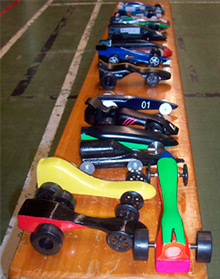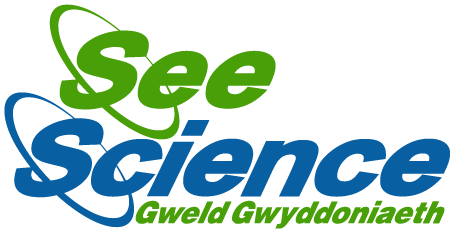Do you have a story to tell?
We would like to hear from teachers who can help us develop case studies giving a flavour of the type of CREST projects undertaken in schools.
If you can contribute, please contact us.
CREST resources
The British Science Association has many free to download project resources available here. Please contact us if you would like help finding resources on a particular theme. Many CREST resources are available in Welsh.
CREST linked schemes
Follow this link for CREST-accredited resources and activities.
CREST case studies
See Science is the Regional CREST Support Organisation (RCSO) Wales. We provide expert guidance throughout the CREST Awards scheme.

CREST brings science to life by offering young people aged 11-19 opportunities to explore real world projects in an exciting and innovative way.

Click on the headings below to expand the content for each case study. Clicking on another heading automatically closes the one previously open.
Ysgol Syr Hugh Owen students make their own plastic!
Ysgol Syr Hugh Owen students make their own plastic!
Students achieve CREST Bronze Awards through inspiring and engaging activities.
Summary
Towards the end of the summer term, a group of gifted and talented year 7 pupils at Ysgol Syr Hugh Owen took part in a workshop to learn how to make their own plastic from milk. They followed this up by carrying out research on the different types of plastic and how they can be used, and then presented their findings in various digital formats. The activity was funded with the assistance of a grant from the Welsh Assembly Government.
- School: Ysgol Syr Huw Owen, Caernarfon, Gwynedd.
- Type of school: Ysgol Syr Hugh Owen is a naturally Welsh medium school serving the town of Caernarfon, Gwynedd in North West Wales.
- Skills: Research - What are the properties of specific materials and how these are related to their uses in everyday life.
Links to Curriculum - KS3 Science
The Sustainable Earth:
- Properties of materials (including sustainable materials)
- How mixtures can be separated by simple techniques.
Scientific skills
- Searching systematically for information for a specific purpose.
- Using a range of apparatus and equipment safely and with skill.
Quote
“We were very fortunate to be able to welcome Robyn to our school. He provided the pupils with an excellent opportunity to practice the enquiry skills that they had developed as part of the KS3 curriculum and to see their relevance in an unfamiliar context. It was very pleasing to see the pupils enjoying the novel practical work and their enthusiastic response to the research task. To cap it all the pupils were most pleased with the impressive CREST certificates that they received!” Dr Huw Williams, Head of Science, Ysgol Syr Hugh Owen.
Project details
Ysgol Syr Huw Owen first got involved with CREST Awards following contact from Heather Hall (See Science), the Crest Local Co-ordinator and an initial workshop day lead by Dr Robyn Wheldon-Williams, Schools Outreach Manager, School of Chemistry, Bangor University; a chemist who was a former pupil at the school. Robyn presents workshops and shows such as ‘The Big, Flash Bang’.
Following a brief introduction about plastics, the pupils watched a demonstration of how milk can be treated to produce a form of plastic, before planning an investigation to make their own sample. The process involves heating the milk and mixing it with acid which causes the protein in the milk to clot. The pupils then strained the mixture to extract this protein, dyed it using food colouring, moulded it into shapes and dried it to form a solid ‘plastic’ material. This protein is known as casein, and was the basis for production of the first plastics in the 1930s, before synthetic plastics became available.
After their laboratory session, the pupils were set the task of researching the different forms of plastics available today, finding out about their properties and chemical structure, and linking this to their uses in everyday products. This information was then presented in a digital format as Powerpoint presentations, Publisher documents, and even MovieMaker which has since appeared on You Tube.
This extended project involving a practical laboratory session, researching and communicating was successfully submitted by the pupils as a Bronze CREST award in the Autumn Term.
Building relationships
Students gained first-hand experience of meeting and working with a chemist, with the added bonus that he was a former pupil of the school! Robyn is also part of the STEM Ambassadors Programme. They were able to use the ideas from a laboratory demonstration to carry out the production of their own sample of plastic, varying the colour and shape of the finished product. The research work on plastics gave them an insight into the variety of different types, properties and uses of this familiar everyday material, and then an opportunity to further develop their IT skills in presenting their findings.
Looking to the future
Having been chosen to take part in this exciting workshop, and then following up their practical work with researching and presenting their ideas, these students have gained a valuable insight into how scientists work. Students have learned to work independently and gained confidence through the experience that was enriching and engaging.
Each year students at Ysgol Syr Hugh Owen take part in a variety of enhancement and enrichment activities in the STEM subjects. In recent years these have included; visits by the Techniquest planetarium and cell dome, a genetics workshop organised by Techniquest, a forensic science day with guest presenters and the visit of a mobile infrared spectrometer from Bangor University. Students have also attended Salters Chemistry workshops and an engineering workshop for gifted and talented girls at the university. A-level students regularly participate in the Engineering Challenge at the university and undertake projects in the Engineering Education Scheme Wales (EESW) where they have an opportunity to gain a CREST Gold Award
It is hoped that as the year 7 students who took part in the ‘Plastics’ activity move up the school and into higher education and employment, they will continue to develop their interest, knowledge and expertise in Science, Technology, Engineering and Maths.
CREST Awards through a KS3 school competition linked to the curriculum
CREST Awards through a KS3 school competition linked to the curriculum
 CREST in a competition format allows groups of pupils from different years to achieve Bronze Awards through linking the investigation to the curriculum and to a ‘real-world’ scenario. The CREST Award provided the competition with an added focus that enables all the pupils to achieve as well as being rewarding and fun.
CREST in a competition format allows groups of pupils from different years to achieve Bronze Awards through linking the investigation to the curriculum and to a ‘real-world’ scenario. The CREST Award provided the competition with an added focus that enables all the pupils to achieve as well as being rewarding and fun.
Summary
Chemistry teacher, Lisa Lock, at Abertillery School has incorporated the CREST Awards into the science curriculum by engaging the pupils in a school science competition. The pupils took part in the competition that linked the curriculum to a ‘real-world’ scenario. This example shows how flexible CREST Awards are in linking with the curriculum in an imaginative way and helping the pupils engage in STEM subjects.
- School: Abertillery Comprehensive School
- Type of school: Mixed comprehensive school
- CREST Awards achieved: Bronze CREST Awards: 68 KS3 pupils in years 7-9
Skills
- Practical and enquiry skills
- Personal, learning and thinking skills
- Team building
- Analytical
Links to the curriculum
The CREST Awards can compliment any part of the science curriculum; in this case the project/competition was written by the chemistry teacher as a class activity that covered areas of the curriculum and provided a ‘real-world’ scenario.
Quote
“I found that the pupils really enjoyed the competition and the problem learning. The pupils have benefitted from being actively involved with CREST Awards at the Bronze level.”
Amateur Sleuthing
 Pupils in years 7-9 took part in a Forensic Science Competition in which they had to solve a ‘murder’ by analysing samples taken from the victim and five suspects. The pupils had to use complex scientific techniques to discover the chemical composition of all the samples, before deciding who may have carried out the crime.
Pupils in years 7-9 took part in a Forensic Science Competition in which they had to solve a ‘murder’ by analysing samples taken from the victim and five suspects. The pupils had to use complex scientific techniques to discover the chemical composition of all the samples, before deciding who may have carried out the crime.
The pupils were provided with a scenario and a number of suspects that had the opportunity to carry out the crime. By carrying out the chemical investigation on the samples only one of the suspects fitted the profile needed. Enquiry and analytical skills were needed to analyse of the results in order to find out who dunnit!
The crime scene scenario was an ideal choice for the pupils who have an interested in CSI and forensic science. By linking the analytical skills and curriculum topics to the competition the pupils were able to learn in a fun and memorable way.
Through their science lessons the pupils not only learnt techniques and skills required by the curriculum but also analytical skills behind forensic analysis and were able to link the curriculum to a the world of work and future careers.
The competition
Three heats were held and the winning team from each, plus the highest runner up were then taken to the DNA Laboratory at Nantyglo School to take part in a Science Winners Championship.
Celebration
“Everyone turned out to be super Forensic Detectives and were a credit to themselves and the school. All pupils were awarded certificates and prizes for participating. The Bronze CREST Award added an extra focus to the activity and enabled all the pupils to gain recognition for their endeavours.”
Looking to the future
Lisa Lock thought using the CREST Award in this format was very successful, with the pupils participating and is considering other projects in the future. She felt that the whole experience had been beneficial for the school and the pupils.
CREST Awards linked into the curriculum through project-based learning
CREST Awards linked into the curriculum through project-based learning
CREST Awards can inspire project based learning linked to the curriculum for all year groups across the school. The initial impetus to inspire the project can be a visiting theatre group, field work or an area of the curriculum with a’ real-world’ context
Summary
Glyncoed’s chemistry teacher, Dr Rebecca Roberts, was keen to incorporate the CREST Awards into the STEM curriculum. During the summer term, Dr Roberts planned to trial CREST Awards with three year groups: years 7, 8 and 11 by designing projects for the three year groups that linked to the curriculum. It was a great success with the participating pupils benefitting from the scheme.
- School: Glyncoed Comprehensive School
- Type of school: Mixed comprehensive school
- CREST Awards achieved: Currently working towards: 18 Silver CREST Awards, 50 Bronze CREST Awards
Skills
- Creative learning
- Problem solving
- Communication Skills
- Project Management
Links to the curriculum
The CREST Awards can compliment any part of the science curriculum, if there’s not a project suitable they’re easy to adapt or write yourself. One advantage is that parts of the curriculum can be given more focus by the pupils and provide them with a sense of achievement as well as enabling them skills; for example to developing communication skills when they present their project to the class using Powerpoint.
Quote
“CREST is a fabulous project-based awards scheme that’s achievable to all pupils whether they’re able and talented or SEN. The best part was watching my SEN class blossom as they realised that this was something they could succeed at and be recognised for. I first heard about the CREST Awards and the benefits of them, after attending a STEM meeting organised by the local CREST contract holders at West Monmouth Comprehensive School. Since then I have integrated the CREST Awards into my teaching scheme. The students at Glyncoed Comprehensive School have benefitted from being actively involved with CREST Awards at the Bronze and Silver level.”
Project details
Dr Roberts has undertaken both the Bronze and Silver CREST Awards.
- Year 7 pupils undertook their Bronze CREST Award research project on Alfred Russell Wallace after having watched the Theatr Na n’Og production ‘You should ask Wallace’. This inspired 7H to do some research into the life of Alfred Russell Wallace and the animals he discovered. They then carried out field work to discover what animals lived in and around Glyncoed Comprehensive School, and the predator/prey relationships of these animals. The project culminated in the pupils producing a food web to show their results.
- Year 8 pupils undertook their Bronze CREST Award research project into the causes and effects of Human Pollution. They then choose one aspect of Human Pollution to investigate experimentally. This project culminated in the pupils producing a report showing which rocks are most affected by Acid Rain.
- Year 11 pupils undertook their Silver CREST Award research project into the fat and salt content of crisps, they choose this project as it held strong links with the AQA Chemistry unit 1b they were currently studying and allowed them to utilise chemical techniques studied in AQA Chemistry unit 3. The focus of the project was to investigate the fat and salt content of different crisps, allowing the pupil to work out experimentally which type of crisps should be eaten by a patient with coronary heart disease. This project culminated in the pupils producing a report showing which type of crisps they would recommend to a person suffering from Coronary Heart Disease.
Benefits/impact on students
The thought of a certificate at the end spurred the Bronze CREST Award pupils on, when times got tough it was this incentive that encouraged them to put in the extra work needed to complete their projects.
For the Silver CREST Award pupils it was the fact that UCAS endorse CREST Awards for inclusion in students’ personal statements and they could take their certificates to their college interviews with them.
In both cases though the CREST Awards inspired pupils to:
- Work collaboratively
- Plan and carry out an investigation
- Develop their presentation and oral skills
Looking to the future
“Having seen the positive impact that the CREST Awards have had on the pupils that have participated in it, Glyncoed Comprehensive School will definitely stay involved with the CREST Awards. In fact, the plan is to incorporate the Bronze and Silver CREST Awards into the curriculum, enabling all pupils to access this award.
“I was daunted at the start, by the thought of all the extra work and uncertainty that would come with introducing the CREST Award to the pupils and school. But sixth months on with a support and guidance from the local CREST contract holder, I’ve finally done it. The benefit that it’s brought to the pupils has far out-weighed problems I may have encountered along the way. So go on give it a try. You’ve got nothing to lose from introducing the CREST Award Scheme and a whole lot to gain.”
CREST Awards through an industry-linked project
CREST Awards through an industry-linked project
 A group of year 9 students gained their Bronze CREST Award by working with the local university and industry to complete the F1 Challenge. Crest supports dynamic and creative project work
A group of year 9 students gained their Bronze CREST Award by working with the local university and industry to complete the F1 Challenge. Crest supports dynamic and creative project work
Summary
A group of four year 9 students from Ysgol Uwchradd Friars in Bangor, Gwynedd formed a team to enter the F1 in Schools Competition which is co-ordinated in Wales by STEM Cymru. Months of dedicated work followed, during which the students developed and raced their own scale model gas powered car.
- School: School Ysgol Friars, Bangor
- Type of school: 11-18 comprehensive school - 1,300 pupils on roll
- Crest Award achieved: 4 Year 9s Bronze Award
- Project Type: Formula 1 in Schools: Designing and racing a Bloodhound scale model car
- Skills: ‘Design and Make’, although the activity also included ‘Research’ and ‘Science Communication’.
Links to curriculum
KS3 Design and Technology: Skills - Designing
- Be creative and innovative in their thinking when generating ideas
- Model and refine their design ideas in 3-D form
- Evaluate, refine and modify their design ideas as they develop in relation to … function, safety, reliability, components, etc
KS3 Design and Technology: Skills - Making
- Develop techniques to ensure consistency and accuracy, including the use of CAM.
- Learn about the properties and characteristics of materials and apply this knowledge and understanding when designing and making products.
KS3 Science: Skills
- Search systematically for, process and analyse information for a specific purpose,…including ICT as appropriate
- Communicate logically by speech, writing, drawing, diagrams, charts, ICT packages, using a wide range of scientific vocabulary
- Work quantitatively using appropriate mathematical conventions and using SI units appropriate to their work.
KS3 Science: Range – How things work
- How familiar devices/machines work by using …energy transfers
- The forces in devices and their relationship to work done and power
Quote
“The team of four here at Ysgol Friars exceeded all expectations and fully deserved to attend the National Final. The work ethic and motivation shown by each member was outstanding. Throughout the entire process, all team members worked together and produced an outstanding design folio accompanied by a well thought out presentation. I am extremely proud of this F1 in Schools team and what they achieved. The team this year have made some valuable additions to the team. Two new members have joined bringing additional skills and motivation, to what was already a successful team driven by success, enthusiasm and motivation.” Shaun Holdsworth.
Project details
Having established their team ‘Fast Lane’ in the autumn term, the students set about researching the requirements of the Bloodhound SSC and how they would build their racing model. To take part in the competition it was essential to keep within the rules, but also to develop novel ideas and explore them. In addition the team were required to produce a business plan, develop a budget and raise sponsorship.
From their knowledge of technology and science, the team knew that aspects of friction, streamlining, lubrication and choice of materials would all play a part in designing and making a successful model racing car.
Being part of the F1 in Schools competition to group had access to the CAD software package Solid works and to Quick CAM to manufacture the car itself. The model Bloodhound car itself was manufactured using a Denford CNC machine at Bangor University, and with their school being only a short walk away, the team were able to be there to see their model being cut from the regulation block of balsa wood!
Following extensive research the team opted for wheels made from a magnesium alloy, it being lighter than aluminium and so reducing the weight of the car further. An additional weight reduction in our vehicle was in the axles. These were made from carbon fibre. Many tests were undertaken to record speed and reaction times. These tests provided a foundation to what eventually would be an extremely fast and elegant bloodhound model.
Further development work involved wind tunnel testing, both virtual and in the real thing, and of course trialling the car along a specially constructed track. For the competition the Bloodhound car needed to be powered by a CO2 gas cartridge and to run along a 20m long track.
The students, with their design and technology teacher as their mentor, spent many hours on research and development work as they prepared their car for the North Wales Regional Final at Bangor University. Having achieved first place they then won themselves a place in the National Finals which took place at the Big Bang Science Fair, ICC Excel in London. Here the ‘Fast Lane’ team came second nationally within the Bloodhound Class! A fantastic achievement!
STEM Ambassadors During their visits to Bangor University and the Big Bang Science Fair in London, the students were able to discuss their project with a wide range of engineers and scientists.
Benefits/impact on students
In taking part in this CREST related F1 in Schools project the students in the ‘Fast Lane’ team have had an unforgettable experience. It has required them to work in their different roles as part of a team, carry our focused research work in a highly technological field, use sophisticated computer software for designing and manufacturing their car, and to work towards external deadlines. All of this will stand them in very good stead for their studies and careers in the future, in whichever field they choose.
Local support
‘Fast Lane’ was successful in gaining support from the following local organisations and businesses including Recognition Express, Welsh Slate, Ysgol Friars, Gwynedd Smart Repair and Bangor University.
CREST resources
The British Science Association has many free to download project resources available here. Please contact us if you would like help finding resources on a particular theme.
Many CREST resources are available in Welsh.
Do you have a story to tell?
We would like to hear from teachers who can help us develop case studies giving a flavour of the type of CREST projects undertaken in schools.
If you can contribute, please contact us.
CREST linked schemes
Follow this link for CREST-accredited resources and activities.
See Science / Gweld Gwyddoniaeth
8 St Andrew's Crescent
Cardiff CF10 3DD
02920 344727
See Science Ltd. Registered in England and Wales. Company Number: 07712605
Design: www.word-smiths.co.uk
See Science / Gweld Gwyddoniaeth
8 St Andrew's Crescent
Cardiff CF10 3DD
02920 344727
STEM resource library
See Science Ltd. Registered in England and Wales. Company Number: 07712605
Design: www.word-smiths.co.uk
